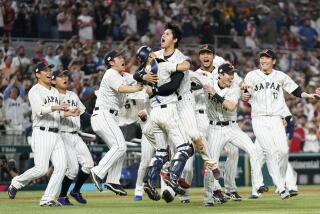Mediators Seek Key to Reopen Baseball Talks
- Share via
NEW YORK — As stadiums remained locked and empty on the second day of a strike by the major league baseball players, a team of federal mediators began searching Saturday for the key that will unlock the stalemated collective-bargaining negotiations.
Donald Fehr, executive director of the Major League Baseball Players Assn., and Richard Ravitch, the chief negotiator for the baseball team owners, met separately in their respective offices with three representatives of the Federal Mediation and Conciliation Service and a representative of the Labor Department.
Both Fehr and Ravitch refused to identify the mediators by name, and they were unavailable for comment later.
“Mediation can be a very valuable tool in solving disputes,” Ravitch said, “but it’s not a panacea. It can be helpful, but I don’t want to create any unreal expectations.”
Fehr concurred on that. He and Ravitch said they weren’t certain when they will return to the bargaining table.
“There’s no feeling at this time that another meeting will be productive,” Fehr said. “It appears things have settled in for awhile. The atmosphere reminds me more and more of 1981.”
He referred to the 50-day strike in the middle of that baseball season. The dispute centered on compensation for the signing of free agents, and mediation failed to produce a quick settlement.
The owners are now attempting to overhaul the compensation system and sell the union on a salary cap proposal that Fehr calls a “Rube Goldberg contraption” designed to deflate salaries by putting an artificial ceiling on the free market.
“It’s the way of Western economies,” Fehr said, “but it’s not good enough for baseball. The mantra of this negotiation has been salary cap.”
The sides remain polarized. The ideological differences run deep. The bottom line is that the union doesn’t accept Ravitch’s contention that the industry is in economic trouble or that the players should have to repay the bigger-market clubs for increased revenue sharing with the smaller-market teams by accepting a salary cap.
“All we want to know is what it will cost to play ball,” Ravitch said again Saturday. “We keep asking the players how much more they want, but we can’t get an answer.”
Fehr said his answer is that a free market should establish how much the players receive. He again said the owners are determined to break the union and have set the clock ticking toward unilateral implementation of their proposal.
“When one party to the dispute begins with the premise that you have to shut the industry down, you can’t expect much to happen until the clock reaches the appointed hour,” Fehr said. “I don’t know when that time will come, but the appointed hour is not here yet.”
Said Ravitch: “It’s not the owners who are on strike. Thirty thousand people are out of work because a union whose members average $1.2 million in salary went on strike.”
Into this debate comes a mediation team trying to defuse the rhetoric, help find common ground, keep the sides talking and facilitate a settlement with recommendations that aren’t binding.
Both sides conveyed their position and view of the dispute to the group on Saturday. It wasn’t certain when the mediators will respond with their initial evaluation, but it’s unlikely Fehr and Ravitch will negotiate again until then.
Gene Orza, associate general counsel of the players’ union, seemed to sum up the situation Saturday when he said of mediation: “Hopefully, it keeps the parties talking even though they are planets apart.”
In the meantime, 28 games have already been canceled and another 14 will be wiped out today, leaving it to minor league baseball to fill the gap.
The minors have drawn increased interest and attendance because of the strike. For example, Columbus drew 11,502 Friday night for its 6-2 loss to Richmond in the International League, up from its average attendance of 7,347.
* RELATED STORIES: C1, C3
More to Read
Go beyond the scoreboard
Get the latest on L.A.'s teams in the daily Sports Report newsletter.
You may occasionally receive promotional content from the Los Angeles Times.










